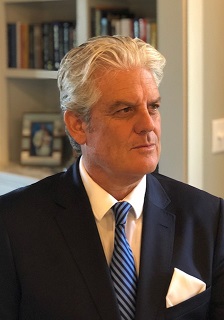From the CEO – July 2021
 Dear Clients,
Dear Clients,
A question I’m asked increasingly often is whether we see any real risk of increased sovereign defaults on the near-term horizon. Much of what underlies the query rests on the now well-known precept that debt moratoria are often just as politically motivated as they are about balance of payments deficiencies. In short, political exigencies very often trump true concerns about a country’s capital structure.
To be sure, our ICRG has a long series of risk indicators that assess the risk of default and other ways in which foreign capital is put in jeopardy, and these indicators have been shown to hold predictive power over both political risk insurance claims and political risk events as measured by news coverage.
But given that some emerging markets – and especially those hit hard by the pandemic – will benefit from the IMF’s decision to bolster their finances through a $650bn allocation of the Fund’s special drawing rights, the question surrounding the nature of sovereign risk has been recast slightly. Clearly, much of the raison d’etre of the Fund is to prevent these balance of payment crises. But can we look at the issue of debt and sovereign risk in a more nuanced and perhaps from a longer-term perspective that goes beyond multilateral support packages?
Ironically, the IMF’s Working Papers series touched on this issue several years ago when researchers showed that excess private debt systematically turned into higher public debt, notwithstanding whether the credit surge resulted in a crisis or a more orderly deleveraging process.
Using our ICRG data as a proxy for overall ‘quality of institutions’ in the modeling, it was found that ‘debt migration’ operates primarily through growth rather than bailouts. In other words, private deleveraging weighs on economic activity, which in turn creates a countercyclical response by government to bolster growth.
In the end, whether this debt substitution results in a net increase or a net decline of overall indebtedness in the economy depends on the extent of the growth slowdown during the deleveraging spell. The piece concluded with the authors suggesting that markets and policymakers should move away from looking at private and sovereign debt in isolation and zero-in on the total stock of debt in the economy, as the line between the two tends to blur. (https://www.imf.org/en/Publications/WP/Issues/2018/06/21/Bailing-Out-the-People-When-Private-Debt-Becomes-Public-45904)
Turning to July’s ratings a few standouts are worth mentioning. In the Americas, Chile’s presidential primaries suggest more moderate candidates will contest the top job. Business confidence is edging up and infections are easing. Over in Cuba, despite the relatively large-scale protests in July, the state’s security apparatus has been quite effective in ensuring the dissent does not pose a significant threat to the regime.
In Europe, public opinion polls show Serin Fein’s lead is narrowing as COVID-19 cases are rising again, while over in the UK, Boris Johnson’s approval rating has fallen but his Tories are still more popular than Labour. The UK’s infections are also nicely trending down.
In Eastern Europe, Prime Minister Sandu’s PAS party won a landslide vote in Moldova’s recent election, campaigning on a pro-EU, anti-corruption platform. Romania’s governing coalition survived another confidence vote, reaffirming its relative strength in parliament. Watch for continued pressure from the country’s vested interests and some continued improvement in consumer confidence levels.
In Africa, Botswana’s official jobless rate is nearing 25%, as the World Bank ponies up a $250mn loan support package. Cabinet fissures continue in Malawi, as the president sacked the Attorney General over a leaked memo. The move comes after the health minister was canned over the government’s handling of COVID-19.
Over in Asia, Indonesia continues to battle higher infections and O2 is being shipped in to help with those in need. The military has assumed a larger role in the policy process, so watch the extent to which democratic institutions might be jeopardized. In Myanmar, the military retains a firm grip on power, financing itself largely through its control of the jade industry.
Finally, in the Middle East, Algeria is releasing some protestors that were jailed during the pre-election protests, and the situation in Iran has deteriorated considerably in the face of another surge in COVID-19 infections and riots over water shortages.
Our new book Quid Periculum? Measuring & Managing Political Risk in the Age of Uncertainty, co-edited and co-authored by Peter Marber (Harvard/Aperture Investors) is now available! The book includes such diverse topics as risk forecasting techniques, reliability measures, the impact of political risk on asset prices and sovereign debt workouts. Also featured is a special roundtable discussion by some of the world’s leading voices in the field on the future of political risk, who combine to address some of the challenges presented by globalization and COVID-19. For more information and to reserve a copy of the book, please contact Louis Carroll, PRS’ Director of Business Development, at lcarroll@prsgroup.com.
July was another productive month for new and returning clients, ranging from some of the world’s top universities to the largest institutional investors throughout the US, Europe, the UK, and the Middle East and Asia.
We are pleased to have concluded our preliminary assessment of Uzbekistan’s risk profile for the Finance Ministry with our most recent data to bring that country into the ICRG fold and have it ranked alongside the 140 countries contained in the index. We are also delighted to have been invited to the ministry’s upcoming economic conference titled: “Uzbekistan: Achievements of economic reforms and outlook” in Tashkent in September.
We continue to work with Elanco – a world leader in developing innovative products and solutions that enhance animal health – to provide select risk profiles of a number of Asian countries not covered by PRS. With Elanco, our client base continues to expand to include firms from a variety of commercial backgrounds as our data and risk forecasting next to no other in terms of its multiple applications.
Not only is ICRG being used by some of the world’s largest technology firms, but the data are now being incorporated increasingly into the artificial intelligence/machine learning space, with an emphasis on ESG data! On this score, we are especially pleased that our data are being used by an increasing number of institutional investors as the empirical connection between our select risk indicators and various asset classes become more pronounced and tradable. Be sure to contact us for our select ESG data bundles.
PRS will be completing its re-branding process this year which will include a new look that pays homage to our 40+ year history, along with various events that helped lay the foundation for our work – some of which extend to the introduction of the Hindu Arabic number system in the Renaissance period and a now-famous exchange of letters between Blaise Pascal and Pierre de Fermat in 1654. As part of the new-look PRS, we will continue to unveil new products which include data bundles of particular importance to the academic world and more timely country risk forecasts available online.
Our ICRG political risk scoring changes were very robust in July, affecting some 90 countries (of 140) and over 100 individual political risk metrics!!
ICRG and related PRS data continue to be the gold standard of all geopolitical risk data among the scholarly and research communities. Using our ICRG risk data, a recent piece on ESG and whether institutional quality affects host government bargaining power and later share of resource rents was illuminated with some surprising results. Have a look here: (https://lnkd.in/d2cMneU)
Another study found ample evidence that deterioration of ICRG political risk ratings has predictive power for both political risk insurance claims and political risk events as measured by news coverage. (https://www.nber.org/papers/w19786)
Thanks for your continued support, and please contact us if we can be of any assistance.

Chief Executive

PRS INSIGHTS
Moving beyond current opinions, a seasoned look into the most pressing issues affecting geopolitical risk today.
EXPLORE INSIGHTS SUBSCRIBE TO INSIGHTS
